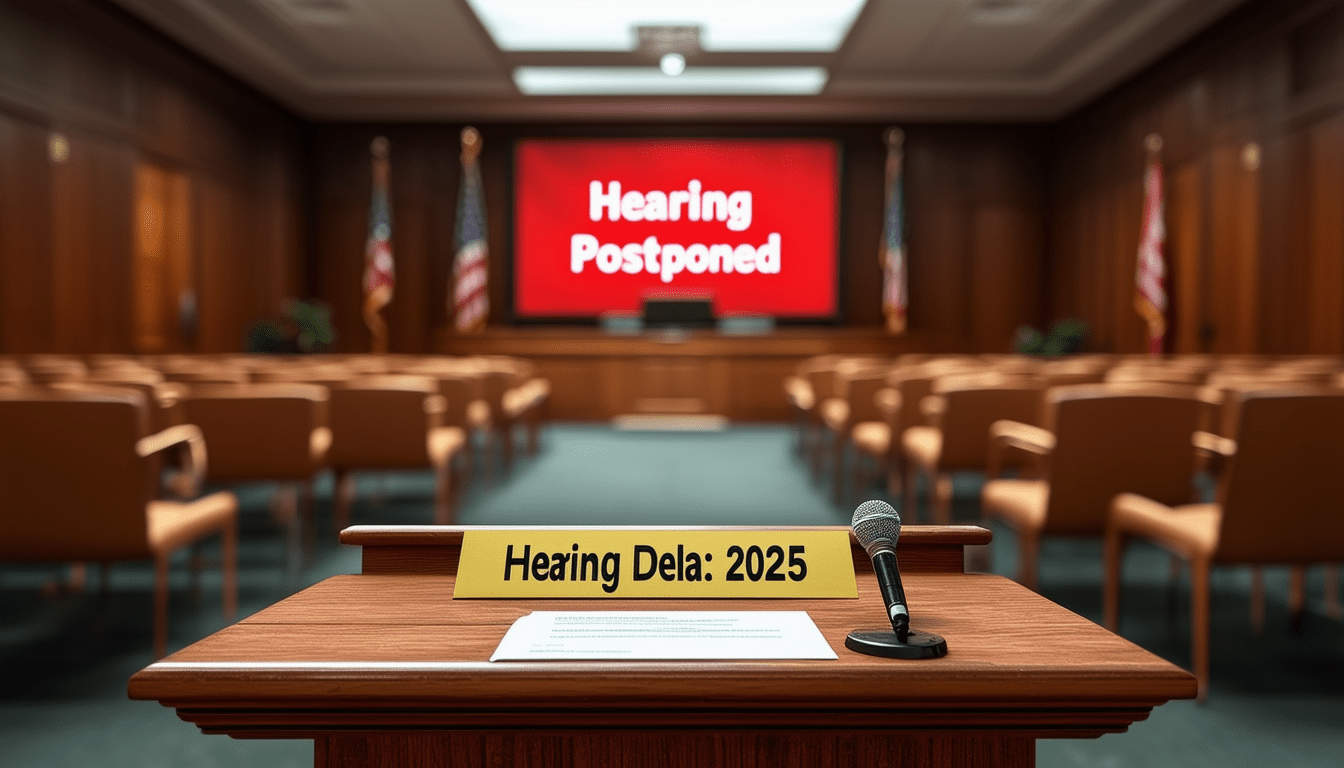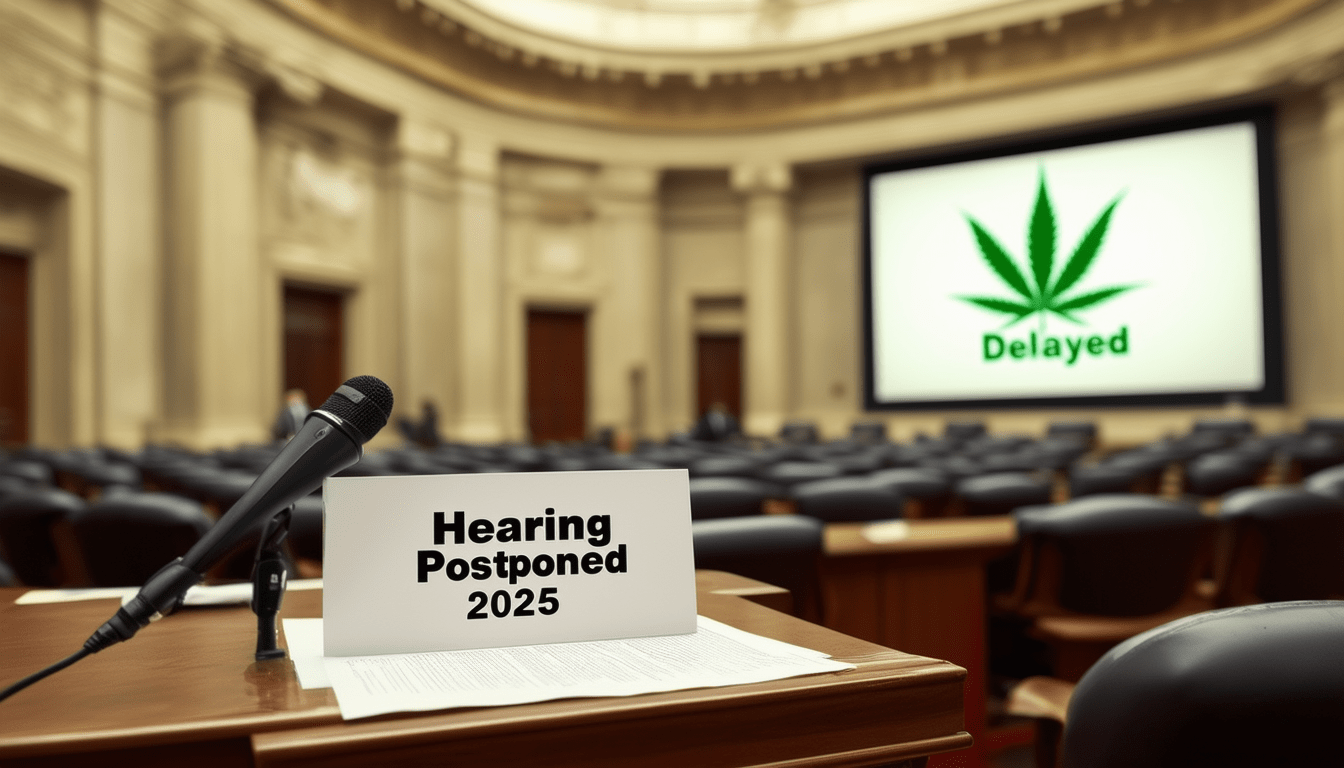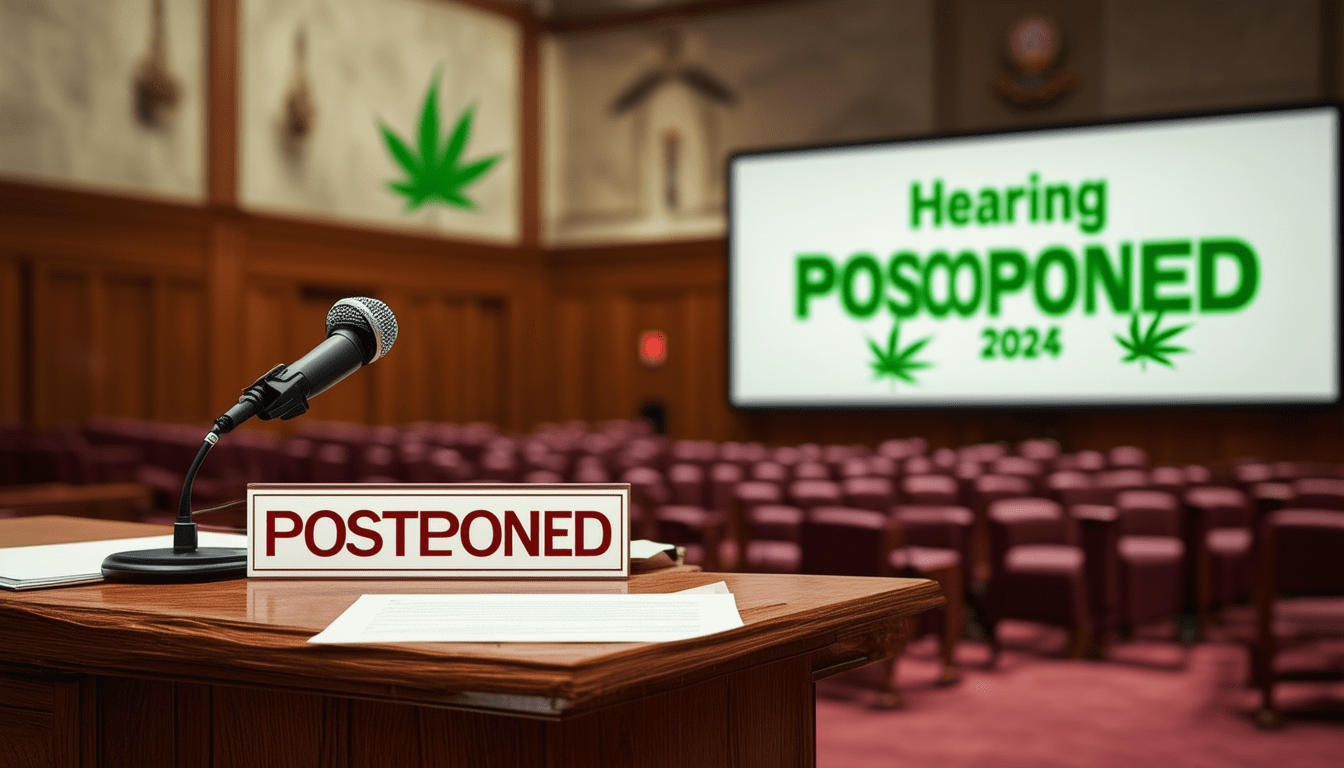Delay Announced: DEA’s Hearing on Marijuana’s Rescheduling Postponed to 2025
|
IN BRIEF
|
The recent announcement of the delay regarding the Drug Enforcement Administration’s (DEA) hearing on the rescheduling of marijuana has raised concerns about the future of cannabis regulation in the United States. Originally slated to take place this December, the hearing has now been postponed until 2025, casting uncertainty over the potential reclassification of cannabis from Schedule I to Schedule III. This rescheduling had been anticipated as a pivotal moment in the ongoing debate surrounding marijuana’s legal status. The implications of this delay are profound, as stakeholders and advocates await clarity on the schedule and framework for evaluating marijuana’s potential risks and benefits.

The Drug Enforcement Administration (DEA) has announced that the hearing regarding the rescheduling of marijuana, originally set for December 2, will now be postponed until 2025. This significant delay comes after critical feedback from Chief Administrative Law Judge (ALJ) John Mulrooney regarding the adequacy of information provided by proposed witnesses. With this postponement, stakeholders who anticipated a speedy resolution to cannabis scheduling are now left to reassess their timelines and strategies.
The Context of Rescheduling Proposal
The Biden administration’s proposal to change marijuana’s classification from Schedule I to Schedule III arose after a scientific review conducted by the Justice Department. Advocates believed that this change would finally lead to a much-needed reform in drug legislation. The anticipated shift in classification is believed to address not only the social but also the economic implications surrounding marijuana use, especially as more states embrace legalization. Initially, advocates hoped to see a finalized rule within the year, a target that appears increasingly out of reach.
Reasons for the Delay
The primary reason behind the delay is a preliminary order issued by Judge Mulrooney, which highlighted deficiencies in the witness list submitted by the DEA. Specifically, the order indicated that the documentation lacked clarity on whether the selected participants support or oppose the proposed changes in marijuana’s legal status. The absence of comprehensive details such as contacts, notices of appearance, and conflicting interests contributed to the postponement. This underscores a significant procedural hurdle, as the DEA is now tasked with ensuring that all participants furnish the required information by November 12.
Participants List and Their Implications
The DEA has outlined a diverse range of witnesses, including representatives from the National Cannabis Industry Association and the American Academy of Hospice and Palliative Medicine, alongside public officials from various states. This extensive list represents a broad spectrum of perspectives, combining both advocates of legalization and those critical of marijuana. The varied composition of voices suggests that the forthcoming discussions may be contentious but important for validating the proposed rescheduling.
The Impact of Administrative Procedures
The current administrative challenges highlight the complexities of navigating cannabis legislation. Observers have noted that the regulatory process can be painstakingly slow, often leading to frustration among advocates who have long advocated for change. Paul Armentano, deputy director for NORML, emphasized that while some had hoped for a swift resolution, it is apparent that the ongoing administrative process is cumbersome. Historical context also indicates that administrative challenges related to drug scheduling often extend far longer than anticipated.
Political Dynamics and Cannabis Support
Despite the delays, there remains a growing bipartisan momentum toward cannabis legalization, as both presidential candidates seem supportive of rescheduling. Recent public comments reflect that both Vice President Kamala Harris and former President Donald Trump favor reforms in cannabis legislation. The political alignment across party lines may enhance the likelihood of eventual legislative changes, although the immediate future appears uncertain.
Public Sentiment and Future Directions
Citizen engagement continues to shape the discourse surrounding marijuana legalization. Public comment periods have seen tens of thousands express their support for changes in marijuana’s legal status. As more individuals become aware of the therapeutic benefits associated with cannabis, the demand for legalization grows stronger. This public sentiment may exert pressure on lawmakers to expedite the necessary changes for rescheduling cannabis, reflecting broader societal shifts regarding substance use.
With ongoing developments in various states and a growing advocacy movement, the landscape surrounding cannabis legislation remains dynamic. As stakeholders await the next steps in the rescheduling hearing process, the conversation around marijuana’s benefits, legal enforcement, and regulations will undoubtedly continue to evolve. For further reading on marijuana benefits, check out articles exploring the benefits and uses of cannabis.
Comparison of Key Aspects Related to DEA’s Hearing Delay
| Aspect | Details |
| Initial Hearing Date | December 2, 2023 |
| New Hearing Date | January-February 2025 |
| Reason for Delay | Insufficient witness information |
| Participants Required Details Date | November 12, 2023 |
| Participants List | Over two dozen selected witnesses |
| Political Context | Support from Biden and Trump for rescheduling |
| Potential Impact | Possibly delays federal cannabis reform |
| Previous Schedule Status | Originally proposed to move to Schedule III |
| Public Involvement | Forty thousand comments received |

The long-awaited hearing by the Drug Enforcement Administration (DEA) regarding the Biden administration’s proposal to reschedule marijuana has been officially pushed back to 2025. This decision comes as a disappointment for many advocates who hoped for a swift resolution to cannabis’s classification under federal law.
Background of the Hearing
In March, the Justice Department proposed a significant change by suggesting the movement of cannabis from Schedule I to Schedule III of the Controlled Substances Act (CSA). This action arose following a comprehensive scientific review, which many believed would lay the groundwork for a decisive shift in cannabis policy. A hearing was subsequently scheduled for December 2, positioned strategically between the upcoming presidential election and the anticipated inauguration.
Insufficient Information Paves the Way for Delay
Despite the initial plans, the Chief Administrative Law Judge (ALJ), John Mulrooney, indicated that the documentation regarding the selected witness participants was lacking critical information. The judge noted that there was no indication about whether these participants supported or opposed the proposed changes, resulting in a call for additional details and clarity. This lack of preparedness has directly contributed to the postponement of the proceedings to January or February 2025.
Witness List and Preparation
The DEA had assembled a list of over two dozen witnesses to testify at the upcoming hearing. Stakeholders from various sectors, including representatives from the National Cannabis Industry Association and the Veterans Initiative 22, were named among those expected to participate. However, Judge Mulrooney emphasized that these selected participants must clarify their availability and prepare supporting details by November 12.
The Road Ahead
While an initial hearing will still occur on December 2, no testimony or evidence will be presented at that time. Designated participants are now tasked with coming prepared with dates for potential hearings on the merits. The ruling process is expected to be lengthy, leading advocates to express frustration over the bureaucratic hurdles.
Political Landscape Shifting
As the delay unfolds, there are indicators of a changing political climate. Both leading presidential candidates have shown support for cannabis rescheduling, which may align the policy landscape favorably in the future. Advocates remain cautiously optimistic, believing that evidence and public opinion may ultimately sway the argument against the outdated classification of marijuana.
Conclusion of the Delay
The postponement of the DEA’s hearing signifies not only the complexities inherent in drug policy reform but also the crucial role of public discourse in shaping these policies. As the deadline for additional information looms, only time will tell how these developments will influence future marijuana legislation.
Key Points on DEA Hearing Delay
- Postponement Date: Hearing pushed to 2025.
- Initial Hearing: Planned for December 2, now limited in scope.
- Participants: Over two dozen selected, but details remained inadequate.
- Concerns: Lack of clarity on support for proposed rulemaking.
- Scientific Review: Triggered the proposal to shift cannabis from Schedule I to Schedule III.
- Bureaucratic Challenges: Federal processes slow down marijuana policy changes.
- Cannabis Classification: Ongoing administrative hurdles complicate scheduling reforms.
- Political Landscape: Bipartisan support exists, yet action remains stagnant.
- Future Outlook: Political candidates increasingly aligned on rescheduling issue.
- Advocacy Groups: Maintain optimism despite delays, urging for evidence-based resolutions.
Overview of the Delay in the DEA Hearing
The Drug Enforcement Administration (DEA) has announced a significant postponement in the hearing regarding the Biden administration’s proposal to reschedule marijuana under federal law. Initially slated for December 2023, the hearing will now take place in early 2025 due to concerns raised about the submission of adequate witness information and procedural details. This rescheduling not only delays the potential reclassification of marijuana from Schedule I to Schedule III but also reflects broader challenges within federal bureaucracy that may hinder future cannabis reform efforts.
Understanding the Implications of Rescheduling
Moving cannabis from Schedule I to Schedule III holds considerable significance for both medical and recreational cannabis markets. Currently, Schedule I classification carries the strictest regulations, which classify marijuana alongside substances like heroin and cocaine. If rescheduled, cannabis would be subject to less stringent controls, making it easier for researchers, medical professionals, and businesses to navigate the regulatory landscape.
Impact on Research and Development
One of the primary benefits of rescheduling cannabis is the potential increase in research opportunities. Currently, federal restrictions impede scientific studies on cannabis’s medical benefits and efficacy. Rescheduling could pave the way for substantial advancements in understanding cannabis as a therapeutic option. Enhanced research could lead to the development of new treatments and improve patient access to cannabis-derived medications.
Economic Considerations
The delay in the rescheduling process could affect the burgeoning cannabis industry, which is highly dependent on regulatory clarity. Many businesses have invested significant resources anticipating changes in the legal status of marijuana. The prolonged uncertainty could hinder investment and expansion opportunities, stifling growth in a market that shows promising economic benefits. Furthermore, local economies that rely on cannabis sales may experience setbacks if regulations remain unchanged for an extended duration.
The Role of Public Opinion and Advocacy
Public perception plays a crucial role in shaping cannabis policy. Despite the ongoing delays, recent trends indicate growing support for marijuana reform across the political spectrum. Advocacy organizations can leverage this public sentiment to keep the conversation alive and encourage lawmakers to prioritize cannabis rescheduling as a key issue. Continuous engagement with the community through education and advocacy efforts can pressure federal agencies to expedite the regulatory process.
Political Dynamics
The current political climate surrounding marijuana policy is uniquely positioned for change. With both major presidential candidates expressing support for cannabis reform, there is an unprecedented opportunity for advocates to push forward their agendas. Political leaders must be held accountable to maintain momentum. By encouraging open dialogues with lawmakers and amplifying the voices of affected communities, advocates can influence the eventual outcome of rescheduling efforts.
Next Steps in the Advocacy Process
Although the hearing has been postponed, advocacy groups should not retreat but rather ramp up their efforts in the interim. Organizations should focus on collecting data that supports the move to reschedule marijuana, compiling studies that highlight its medicinal properties, and showcasing the economic benefits of legalization. Additionally, collaboration among various stakeholders, including medical professionals, researchers, and industry representatives, can create a unified front that illustrates the multifaceted advantages of rescheduling cannabis.
Preparing for the 2025 Hearing
In preparation for the upcoming hearing in 2025, stakeholders must ensure that proposed witnesses are well-equipped with necessary insights to present at the hearing. It will be important to address the logistical concerns identified in the judge’s preliminary order to ensure that the hearing can progress smoothly. Diligently gathering comprehensive testimonials and establishing clear communication channels among participants will be essential in reinforcing the case for marijuana rescheduling.
Frequently Asked Questions
What is the reason for the delay in the DEA’s hearing on marijuana rescheduling? The delay has been attributed to insufficient information regarding the participants who were selected to testify, as indicated in a preliminary order from Chief Administrative Law Judge John Mulrooney.
When is the new date for the DEA’s hearing on marijuana rescheduling? The hearing has been postponed to January or February of 2025, with an initial hearing still scheduled for December 2, 2023, but with no testimony or evidence being taken at that time.
Who will be participating in the hearing? The selected witnesses include a range of stakeholders such as governmental representatives, industry associations, and various advocacy groups, although details of their support or opposition to the rescheduling remain unclear.
What implications does this delay have for cannabis rescheduling? The postponement indicates that the process to move cannabis from Schedule I to Schedule III will not likely be completed before the upcoming presidential inauguration, potentially affecting future legislative actions.
How long has the Justice Department been considering rescheduling marijuana? The process started approximately seven months ago when the Justice Department proposed the change after a scientific review of cannabis.
What do advocates think about the delay? Advocacy groups remain hopeful despite the delay, arguing that the political climate regarding marijuana rescheduling is aligned, and that it is only a matter of time before changes occur.
Are there any concerns regarding DEA’s skepticism about marijuana rescheduling? Some view the scheduling of the hearing as a sign of DEA’s skepticism, especially given their request for additional information related to the scientific review of marijuana.
What was Vice President Kamala Harris’s stance on the delay? Vice President Kamala Harris cited federal bureaucracy as a contributing factor to the delay, indicating frustration with the lengthy process of rescheduling marijuana.
What is the overall sentiment among cannabis policy advocates regarding the administrative process? Advocates express optimism that the evidence supporting marijuana’s rescheduling will ultimately prevail over opposition, facilitating an end to federal cannabis prohibition.





Post Comment